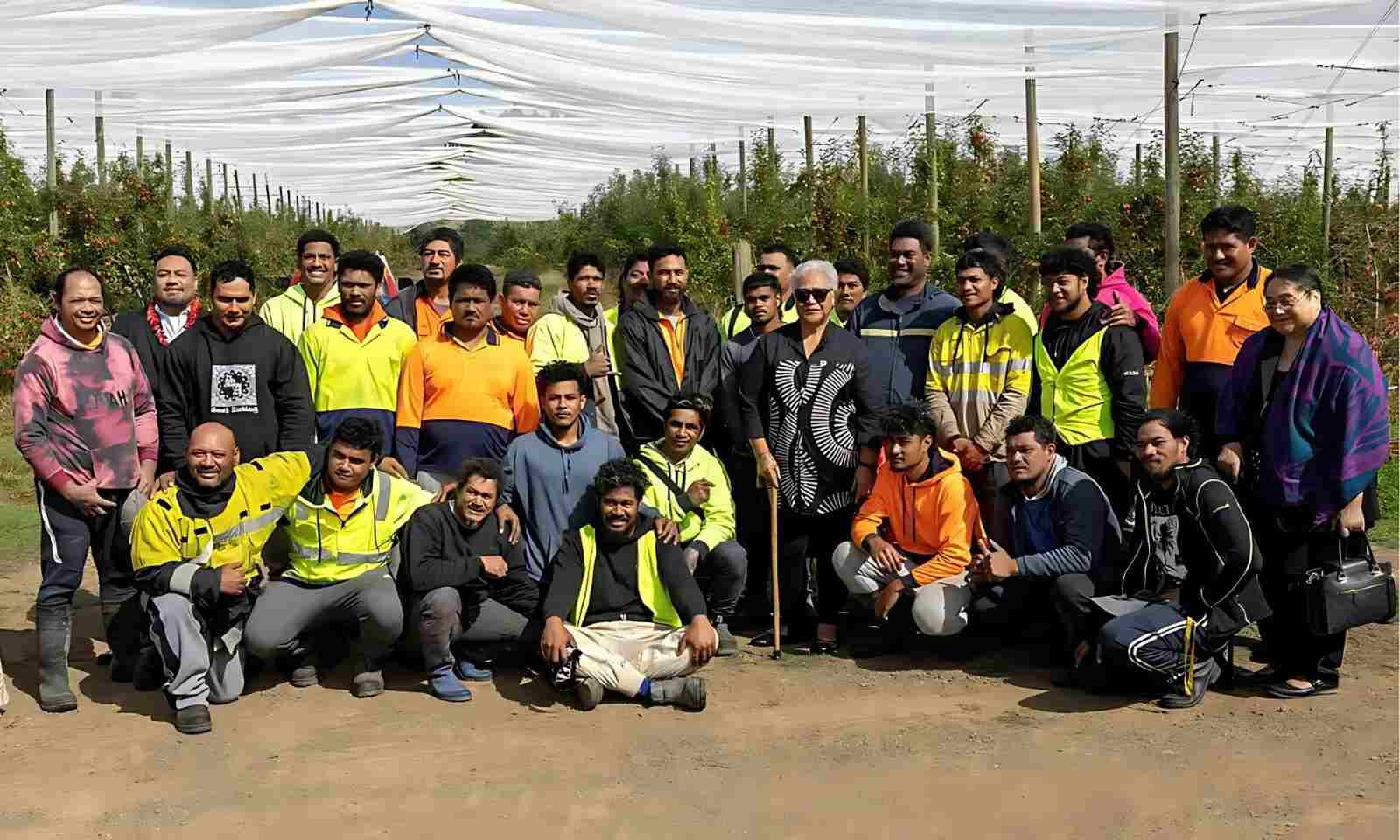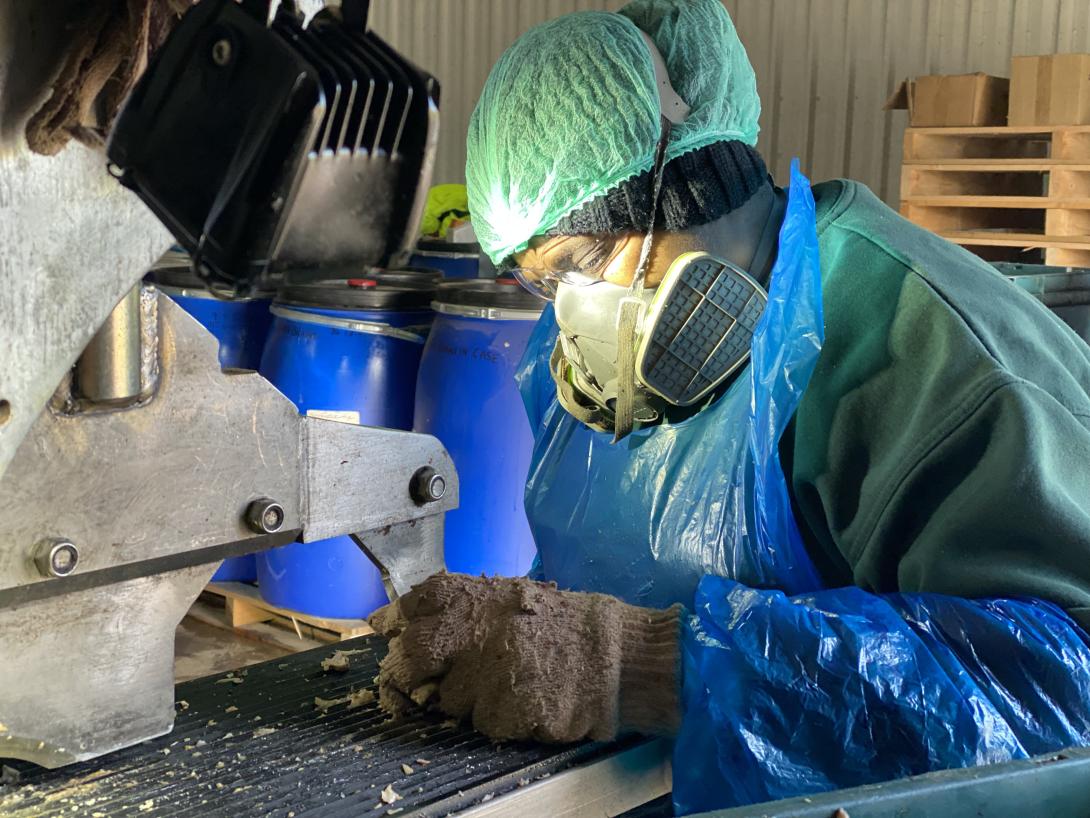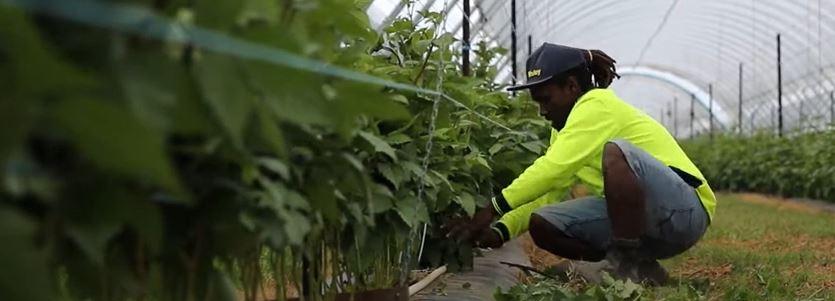

Photo/ABC Wide Bay/Audrey Courty/file
Pacific island workers reassured as Labor's re-election preserves key mobility scheme
Following Prime Minister Anthony Albanese's recent election victory, Pacific nations relying on the labour mobility (PALM) scheme are optimistic about the continued flow of seasonal workers to Australia.



The Sāmoan Tenor named Pati who turned disadvantage into an operatic destiny


‘One of our most trusted leaders’: Tributes flow for a beloved rangatira


Argentina eyes Pacific Islands Forum dialogue partnership as NZ says nations must decide

The Sāmoan Tenor named Pati who turned disadvantage into an operatic destiny


‘One of our most trusted leaders’: Tributes flow for a beloved rangatira
Pacific countries that send seasonal workers to Australia can now breathe a sigh of relief following Prime Minister Anthony Albanese’s emphatic victory at the recent federal election.
If Albanese had lost last week's poll, the nine Pacific countries participating in the Pacific Australia Labour Mobility (PALM) scheme were likely to face major setbacks in sending workers.
Fortunately for regional labourers, Albanese and his Labor Party were re-elected on 4 May. It remains uncertain whether he will change the migrant work programme.
Labor had previously made substantial reforms to the scheme, including eliminating an agricultural visa, requiring Pacific workers to receive the same pay levels as Australians in comparable jobs, and mandating a minimum 30-hour workweek.
Former opposition leader Peter Dutton’s Coalition had promised to review the PALM scheme, which currently includes more than 30,000 workers across 500 workplaces in every Australian state and territory.
The Regional Workforce Management (RWM), a central recruitment agency, has emphasised that Pacific workers would miss out on crucial employment opportunities in Australia if Labor had failed to secure re-election.
In an interview with PMN Fiji, RWM Culture and Welfare Officer Mika Seduadua, who hails from Rewa in Fiji, states that Dutton's plan to reinstate the Australian Agriculture Visa and review the PALM scheme could have opened the Australian labour market to workers from Asia.
Speaking from Brisbane, Seduadua, one of two Pacific islanders at RWM responsible for the welfare of Pacific workers, says, “This will mean that fewer of our Pacific workers will come here for work.
“To put it into context, there are 42,000 Fijians waiting to come to Australia under the PALM scheme to work. Opening the market to Asia will cut down these numbers, not only for Fiji but for the whole Pacific,” he adds.
Impact of Dutton's Coalition
Dutton had proposed a plan for the agricultural sector that included reinstating the Australian Agriculture Visa, which the Labor government had previously abolished, and reviewing the PALM Scheme, possibly eliminating the minimum weekly hours for visiting Pacific workers.
Seduadua says the proposed plan would heavily impact the stable work and pay structure currently upheld by the PALM scheme.
“Right now, the PALM Scheme is running well, the work is good, and the conditions are good,” he says. “For example, those in the meatworks are rostered and they do shift work - day shift, afternoon shift, and night shift, which is consistent throughout. The wages are good and the work conditions are good.”
Seduadua, who has worked with the recruitment company for several years, emphasised that reviewing the PALM scheme and the potential removal of minimum working hours could impact pay parity.
Under the scheme's pay parity requirement, workers who acquire skills and experience adjust their pay to match that of their colleagues in the same position, who may be earning more.
“Like in meat processing, say you come in and are getting paid $25 an hour and the person standing next to you is getting paid $30, under that pay parity requirement, your pay will be brought up to match that worker.”

Sāmoan Prime Minister Fiamē Naomi Mata’afa, centre, with Sāmoan PALM workers in Australia in 2023. Photo/Pacific Australia Labour Mobility scheme/Facebook
The future of Pacific labor in Australia
He says that reviewing the PALM scheme and possibly eliminating the minimum hours requirement would severely impact Pacific workers, most of whom rely on the employment the scheme provides.
“The PALM scheme is a good opportunity for us, as we don’t have many employment opportunities or even new employment opportunities back home. Many who have finished high school and tertiary studies are unemployed, and some have graduated but still don’t work. For us in the Pacific, it’s a good opportunity to come, work and earn an income for ourselves and our families.”
But Seduadua says that Australia still benefits from the PALM scheme, even with Dutton's proposed plan.

Culture and Welfare Officer Mika Seduadua, of the central recruitment agency Regional Workforce Management (RWM) in Queensland. Photo/Facebook
Opportunities vs exploitation
Dr Abul Rizvi, a former Deputy Secretary of the Department of Immigration, had earlier expressed concerns that the agriculture visa for Pacific Island nationals has been a failure from the start, leading to exploitation that bordered on slavery and even fatalities.
In an op-ed for the Independent titled ‘Head in the sand approach to P.A.L.M. visa continues’, Rizvi warned that “the situation goes from bad to worse, with government ministers continuing to deny the problems of employer exploitation, an extraordinary death/injury rate and vast numbers of PALM workers running away from their sponsoring employers to apply for asylum.
“When Australia embarked on its first low-skill agriculture visa over a decade ago, I could not believe we were going to copy what every other nation with such a visa had experienced. Somehow, we were going to be so much cleverer with such a visa than every other nation where such visas have been a disaster. It was either pure arrogance or naivety - I am not sure which.”
The troubling history of agricultural visas
In 2020-21, National Party representative David Littleproud announced plans to expand the Pacific Island visa into a demand-driven agriculture visa for ASEAN nations, which he claimed would be operational by Christmas 2021. The National Farmers’ Federation, which had lobbied for such a visa for decades, was ecstatic about the announcement because it would provide them with easily exploitable farmer labourers, Rizvi says.
“At that time, I wrote that going down that path would forever change the character of Australia for the worse. I wrote about the range of risks associated with such visas. Not surprisingly, the Department of Foreign Affairs and Trade (DFAT) dragged its feet in establishing agreements for this visa. Even DFAT could see the disaster such a visa would be (and it's usually DFAT that is the last to understand such risks).
“The new Labor Government abolished Littleproud’s agriculture visa (apart from allowing 1000 agriculture visa workers from Vietnam due to an existing MOU). Australia had dodged a bullet. But it continued with a low-skill agriculture visa for Pacific Island nationals, presumably for regional security reasons.”
Rizvi noted that this decision has had dire consequences.
Seduadua says Pacific workers have significantly benefited from the PALM scheme, which has improved their lives and living standards in their home countries.
“We’ve been doing well under the scheme. Those who have come to work have achieved their plans to build better homes for their families, put their children through tertiary education, buy cars, start small businesses and improve their livelihoods.”

Photo/palmscheme.gov.au
Impact of Asia labour hire
He adds that the introduction of the Asia labour hire programme will decrease the number of workers from the Pacific, but the scheme and Australia will still benefit.
Since the Labor government replaced the seasonal workers programme with the PALM scheme in April 2022, Seduadua says that RWM has recruited thousands of workers from Pacific countries for various roles in the meat industry, food processing, and horticulture.
Currently, there are about 5000 workers, and they expect to increase that number to 6000 by the end of the year.
“When the programme started, we recruited around 10,000 workers from Fiji, Sāmoa, Tonga, Solomon Islands, Vanuatu, Papua New Guinea, Kiribati, Nauru, and Timor Leste,” Seduadua says. “When the PALM programme started in 2022, they had only three-year work contracts.
“In June 2023, it was extended to four years, so we are continuing to get more labour from our Pacific island countries.”
You can watch Mika Seduadua's full interview in the Fijian language on PMN Fiji here.

Photo/Pacific Australia Labour Mobility scheme